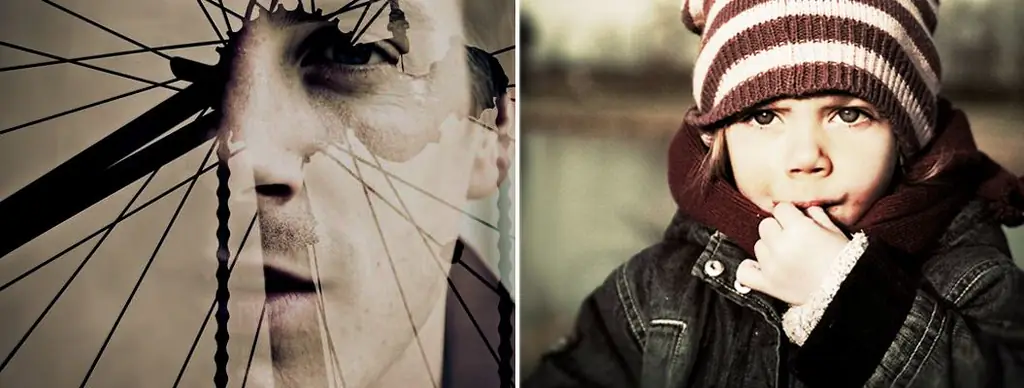- Author Adrian Jeff jeff@psychologosportal.com.
- Public 2023-12-17 05:06.
- Last modified 2025-01-24 14:09.

How to live after returning from the war?
The reality of war breaks you down and remakes you … or you die …
Upon returning from the war zone, many feel as if the war has remained inside them, they are fighting in their sleep, they continue to feel themselves on edge, in a state of threat, it is difficult for them to switch to life in peaceful conditions. In their memory, dead neighbors or comrades who remained to fight constantly pop up, individual moments of those terrible events - as if a part of the soul remained there forever.
People who have returned from the combat zone find themselves, as if in a different reality, where those around them live a peaceful life that turns out to be alien to them. They have a feeling of dissonance: the inner state is so different from the world around them that it is difficult for them to find themselves in society. Everything inside is tuned in a different way …
When the war won't let go
Often, such people feel like outcasts, they begin to think that they were born only for war. At night, they dream with shootings, bombings, the death of comrades or civilians. Any rumbling or loud noise is perceived as an explosion or shot. A person continues to live in war, even after returning to normal conditions.
In a peaceful life, it is impossible to experience such a shock. You change internally, there is a restructuring of all the mechanisms of the psyche, in some way you become a different person, which you have never been before and did not even think that you could be. The situation demands - otherwise you will not survive, otherwise you will not return, otherwise you will not fight.
The reality of war breaks you down and re-sculpts you … or you die.
You are returning from hell, but you only know how to live like hell. There is no stress, no shock, no blow to the psyche that will switch you back. Let there be no weapons in your hands - it remains in your head. You are constantly waiting for a threat, you are in suspense, you are not all here, you are there, in the war. And here family, children, friends, you need to work, visit, walk and smile - but how to do it? How to get yourself back to your old self? How to start living anew? And is it possible?..
The answer varies depending on who you were in the fighting. Were you in the ranks of the active army or among the civilian population. Let's talk about this in more detail from the standpoint of the System-Vector Psychology of Yuri Burlan.
War is a different world
For centuries, mankind has sought to live peacefully, military solution to conflicts was considered an extreme measure, and all the efforts of culture have formed in us a certain style of behavior - ensuring life in a peaceful society.
As Yuri Burlan's System-Vector Psychology explains, in a peaceful life, a person is limited by various kinds of prohibitions that guarantee the survival of the entire human community. It is thanks to the subconscious prohibition on murder that a peaceful life gives a sense of security and safety to all members of society. And only in conditions of security mankind gets the opportunity to go into the future, develop, become more complex - this would be impossible in a state of constant threat and fear for their lives.

What happens to a person in wartime? He loses this feeling of security and safety. The civilian population is saved. Army - digs into the ground to get victory.
Post-war combatants syndrome
In the event that a person enters the active army as a warrior, cardinal changes take place in his psyche. Only those who have lifted the initial prohibition on killing can survive. In war, the laws of peaceful life are reversed: murder becomes a manifestation of valor, and not an act entailing punishment. All post-war syndromes are based on the fact that the most ancient and basic unconscious human prohibition - on killing - has been lifted and has not been imposed back.
There is one more important nuance here. If you remember history, then you know that after the Great Patriotic War, millions of soldiers who came from the front did not have any syndromes, the overwhelming majority of them returned normally to a peaceful life. This is also explained by the System-Vector Psychology of Yuri Burlan.
The fact is that most military conflicts were built on a predatory principle - when a person goes to kill others in order to get something for himself. He goes to take other people's lives in order to get his own benefit. In this case, he experiences a colossal super-stress - every minute spent "there", behind the front line, he desperately fears for his life, which literally burns his nerves. After that, he has monstrous dreams, terrible memories are piled up, he has severe psychopathic disorders …
The situation is quite different when it comes to wars of liberation. Defending his land and his people, a person enters the battlefield with a different attitude - he goes to give his life in the name of his Motherland. And therefore does not experience wild horror, wild superstress, his psyche does not undergo such a deformation. He goes for the "blue handkerchief" and for everything that is dear to his heart and returns from the war as a winner … without any syndromes.
Post-war stress of civilians
System-vector psychology draws attention to the fact that when a person finds himself in a combat zone as a civilian, other mechanisms work. He cannot defend himself and his home - otherwise he would be in the army. He is saved. And here she experiences the most severe super-stress, experiencing fear for herself, for her children and loved ones.
Among other things, doctors include the appearance of various kinds of somatics, including cancer, among the consequences of such super-stress. There is even the term "traumatic stress", which stands for the occurrence of illness as a result of the endured horror and suffering. It is systematically clear that, depending on what innate properties of the psyche a person has, the transferred stress will affect him in different ways.
The owners of the visual vector from strong emotional losses may have vision loss, in skin people - all sorts of skin diseases, tremors, tics, in people with the anal vector - gastrointestinal diseases, stuttering, and so on. Once in peaceful conditions, such people will experience great difficulties in order to feel life normally again, get out of a stupor, panic attacks, stop rushing around, and start sleeping again.
In addition, children become victims of war. If an adult, having experienced over-stress, after a while, is able to recover, then a child is not.
The fact is that every child receives a sense of security and safety from their parents. As long as this feeling is there, the child can normally develop his properties, grow up. When this feeling is absent, he stops developing. And if a serious threat to his integrity appears in the child's feelings, this can lead to irreversible deformation of the psyche.
However, such damage can be completely prevented if you understand how it works. In the classroom on Systemic Vector Psychology, Yuri Burlan always gives an example from the film "Life is Beautiful". Having got into a concentration camp with his father, a little boy, despite all the horror of what is happening around, does not receive any injuries - the father makes everything into a game and makes sure that his child does not suffer and does not worry about anything.
Psychotherapy for returnees from the war zone
In any case, people who are in the combat zone, people who have returned from the combat zone, need psychotherapy. It will not "pass by itself", you need to work with it, you need to return yourself to life.
Fighting is a revolution in the psyche, turning it upside down due to the forced need to transcend the basic prohibitions of peaceful life, a huge trauma for any of us - both civilian and military.
Of course, it takes time to recover, but only a deep understanding of oneself, true, present, to the very depths of hidden desires and motives, gives a real opportunity to return to a peaceful life both physically and mentally.
Here is what the residents of Donbass say, who, even while in the combat zone, managed to return to normal life after classes on System-Vector Psychology by Yuri Burlan:
All reviews are here:
Whatever happens there, in the war, it is possible and necessary to return to yourself, to become yourself again. How to do this will be taught in the classroom on Systemic Vector Psychology by Yuri Burlan.
Admission is free and anonymous for everyone. The training is completely free for residents and refugees from Donbass.
You can register for free introductory classes at the link:






